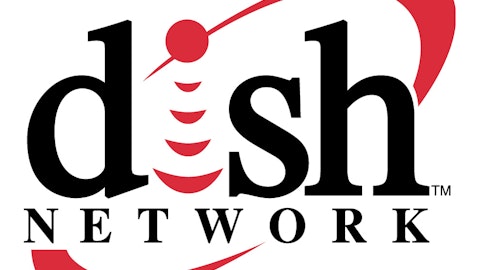
Put simply, the company is in a similar business to Skype–with its unlimited international calling to the U.S. and over 60 countries plans, the company’s product is an excellent competitor in the making. This, the fact that stock price is up 42% in the past 12 months, and a buy call from Kevin Robinson at Sumzero last week, made me become interested in the stock. To my surprise, I found several reasons to believe that there is more room for stock price increases, and even after the amazing rally that made Vonage Holdings Corp. (NYSE:VG) almost double its market cap size in 12 months this stock may still be too cheap.
Real revenue growth is about to start
Looking at the revenue graphs, we find that the company’s revenue declined from the prior year. According to the company slides, this is due to the impact of lower Universal Service Fund (“USF”) fees and the expansion of lower priced offerings to meet customer needs. But although revenue decreased, the last EBITDA came out at $34 million, up $2 million from the prior year. Profitability increased by a small margin, although revenue is not growing.

The fact that profitability increased while revenue decreased is a signal that the business seems to be financially stable. Furthermore, the short term absence of growth has caused most analysts and investors to overlook Vonage’s real growth potential. As Kevin Robinson wisely points out, Vonage Holdings Corp. (NYSE:VG) has been preparing some amazing future growth by investing strategically in its marketing and distribution channels. The slides of the earnings call presentation pointed out that the last EBITDA includes investments of $6 million in “growth priorities:” international expansion, mobile and BasicTalk. This explains why EBITDA grew despite the decrease in revenue.
This investment could pay off well: 375 part-time sales agents will start approaching community teams, selling directly to ethnic groups. There is also $30 – $35 million planned for investing in implementation of software solutions and network equipment. These factors suggest that the current 2014 consensus EBITDA of $133 million will be beaten by a surprisingly decent margin.
Patents
There is valuable intellectual property here: about 59 patents, including the U.S. Pat. No. . 8,213,594, (“Method and Apparatus for Placing a Long Distance Call Based on a Virtual Phone Number”), which relates to a virtual number that allows somebody to call from a number that appears to be in the same country, thereby enjoying local rates. This and other patents could help Vonage Holdings Corp. (NYSE:VG) to get some royalties in the future.
Targeting under-served segments
Vonage Holdings Corp. (NYSE:VG) has a first-to-market approach and a focus on “under-served population segments,” where demand for domestic and international calls remains very strong.
Churn is decreasing
Churn has declined from 3.6% in July 2009 to 2.5% at the end of 2012, showing the positive effects of improvements in overall customer experience. In 2012 alone, churn decreased by 30 basis points over the course of the year, from 2.8% in the first quarter to 2.5% in the last one.
Stock repurchases
Everybody loves stock repurchases because they help to increase earnings per share artificially Well, Vonage has already authorized a program to repurchase up to $100 million of its common stock by the end of 2014 (as much as 16% of the current market capitalization), which is a much more aggressive plan than the original $50 million plan. Since the beginning of the program last August, Vonage Holdings Corp. (NYSE:VG) has purchased 14 million shares.
Value
According to Robinson, Vonage is definitely a value stock. According to a DCF model, Vonage is worth $3.49 per share, excluding NOLs of ~$0.73. Furthermore, Robinson’s EBITDA estimates suggest an upside limit of $4.76 per share and a downside of $2 per share, using the lowest EBITDA figure and EV/EBITDA multiple over the past 5 years. Using an LBO valuation, Robison thinks that the odds are high that Vonage becomes private at $3.51 per share.
Robinson is not the only one thinking that at $2.79 per share, Vonage is too cheap. Michael Lewis reminds us that even after a massive run-up on stock price over the past 12 months, Vonage Holdings Corp. (NYSE:VG) still trades for less than 5 times trailing EBITDA. And if we annualize the past quarter’s EBITDA, the company trades closer to 4.5x.
Now, remember when Microsoft Corporation (NASDAQ:MSFT) bought Skype for $8.56 billion in cash in 2011? In 2010, Skype had revenue of $860 million, on which it posted an operating profit of $264 million. This implies that Microsoft Corporation (NASDAQ:MSFT) paid almost a 10x multiple on annual revenue. Therefore, under a “Microsoft valuation,” Vonage could be worth as much as Skype back in 2011, since according to Morningstar Vonage’s annual revenue in 2012 came out at $849 million.
A final word on competitors
Note that Skype is Vonage’s main competitor. Vonage deals with this issue by performing aggressive marketing–the “Don’t believe the Skype” marketing campaign to promote Vonage Mobile is one example. Now, I have used both and have concluded that Vonage has nothing to envy Skype in terms of functionality and sound quality, which tells me that the company is prepared for fierce competition. However, Microsoft Skype’s main competitive advantages are that it is available on more platforms and it is more popular. Therefore, although “you’d still pay 30% less than you would on Skype” by using Vonage, I do not expect them to win this market soon.
Vonage is also competing against telecom giants like Verizon Communications Inc. (NYSE:VZ). The rivalry between Vonage and Verizon Communications Inc. (NYSE:VZ) is not new: in 2006 Verizon filed a lawsuit charging that Vonage infringed on five of Verizon’s patents related to its VoIP service. As a result, Vonage Holdings Corp. (NYSE:VG) had to pay $58 million in damages and a 5.5% licensing fee per subscriber per month. Luckily for Vonage, the emphasis on under-served populations and a strong pipeline of new products (Vonage World Plus and Basic Talk, which is launched nationwide via partnership with Wal-Mart) are strong competitive advantages in the making. Notice also that telecoms like Verizon spend huge amounts of money in maintaining their networks: about $9 billion per year just in wireless capital spending! Vonage is way more cost efficient.
But even without Verizon Communications Inc. (NYSE:VZ) directly marketing its VoIP services to consumers, the market is very fierce with Microsoft Corporation (NASDAQ:MSFT)’s Skype, Whatsapp, Line (mainly used in Asia) and Viber, just to mention a few names. But the emphasis on the Vonage Box, which allows users to use their Internet connection for computer and phones at the same time so that they can use Vonage for calling landlines, is a big competitive advantage that shall protect Vonage from fierce competitors, especially in emerging markets.
The article Why Big Telecoms Are Very Worried About This Stock originally appeared on Fool.com and is written by Adrian Campos.
Adrian Campos has no position in any stocks mentioned. The Motley Fool owns shares of Microsoft. Adrian is a member of The Motley Fool Blog Network — entries represent the personal opinion of the blogger and are not formally edited.
Copyright © 1995 – 2013 The Motley Fool, LLC. All rights reserved. The Motley Fool has a disclosure policy.






